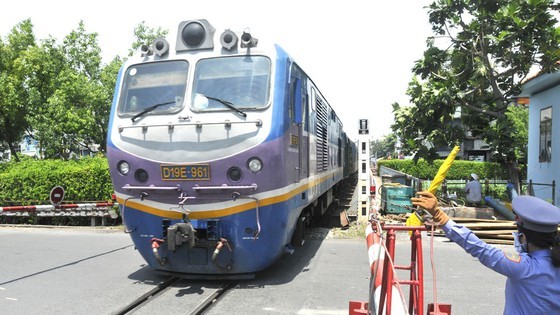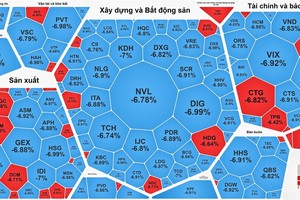
Enterprises in the industry continued to face difficulties and were unable to balance their revenues and expenditures. The railway industry has encountered more difficulties because the problems arising after it was transferred to the Committee for Management of State Capital at Enterprises (CMSC) have not been resolved, while the Ministry of Transport refused to take back this enterprise.
According to the Vietnam Railways Corporation, although efforts have been made to boost freight transportation during the outbreak of Covid-19, especially to take advantage of the export of agricultural products to China, however, the revenue of the railway industry is still extremely poor.
It is expected that the revenue of railways enterprises this year will merely reach above VND3.2 trillion, down 35.6 percent compared to last year. With such results, enterprises will see a loss of more than VND616 billion. To ease difficulties for enterprises, the VRC has just proposed the State to exempt charges for the use of railway infrastructure which accounts for 8 percent of annual transportation revenue, estimated at VND214 billion. At the same time, it proposed the State to exempt and reduce around VND7.4 billion of rent of national railway infrastructure assets invested by the State in the railway industry. However, these are instant proposals to resolve the current difficulties of the industry, helping enterprises to maintain and recover production and business activities after the pandemic, ensuring jobs for workers. The railway industry still has to face greater challenges.
According to Mr. Nguyen Ngoc Dong, Deputy Minister of the Ministry of Transport, ministries, and industries have been seeking ways to resolve the stalemate for the VRC as the ownership transfer of the State capital has caused the allocation of the State budget estimate for the maintenance of the railway infrastructure invested by the State to be unable to carry out because it is against the current regulations of the State Budget Law. With the agreement of the Government, this year, the allocation of the budget estimate to the VRC will still be carried out as previous years to ensure the safety of train operation. From 2021 onwards, the railway industry will have to follow the same regulations as other enterprises.
The current difficulties have been removed. However, Mr. Nguyen Hoang Anh, Chairman of CMSC, said that the actual difficulties of the industry are still the quality of infrastructure and outdated technology. Its market share declined as it could not compete with road and air transportation for passenger transportation and could not compete with sea and road transportation for freight transportation. Difficulties are also originated from the thinking of subsidy, monopoly, slow innovation, professional skills, and the business administration skills of the staff in the industry.
In comparison with other enterprises, the VRC has the advantage of not only doing pure business but also managing the railway infrastructure assets invested by the State. Around one-third of annual revenue and half of the jobs of more than 10,000 workers of this enterprise come from managing and maintaining the national railway infrastructure with the state budget of around VND2.8-VND3 trillion per year. Many people said that the fastest way to resolve the stalemate for the railway industry is to return to the Ministry of Transport. However, the ministry has sent a document to the Prime Minister, refusing to take back this enterprise.
According to Deputy Minister Nguyen Ngoc Dong, if bringing the VRC back to the Ministry of Transport, it means that it is not in line with the policy of the State to continue to promote the restructuring of state-owned enterprises. Mr. Nguyen Hoang Anh, Chairman of CMSC, also said that the problem of the VRC does not come from the management agency, but from limited investment resources, inadequacies in management mechanism, and operating model. Meanwhile, the mechanism to facilitate the enterprise's autonomy in production and business activities has not been available yet.
Therefore, the CMSC asked the Prime Minister to direct the Ministry of Transport to urgently implement the planning of the railway network from 2021 to 2030, with a vision to 2050, clearly determine the type, role, position, scale, and exploiting orientation for the railway industry. Especially, the capacity to meet the transport needs of the industry, the ability to connect railways with other types of passenger transport, and major economic centers of the country must be determined to make the appropriate investment. CMCS also proposed that there must be solutions to develop the station system, commercial facilities, and services, and build a mechanism to help the railway industry develop its potential.
Besides, it is necessary to soon approve the scheme on management and the use of national railway infrastructure assets invested by the State. Currently, the Ministry of Transport is asking for opinions of relevant ministries and industries about the project, proposing the Government to assign the VRC to manage and use the national railway infrastructure assets, excluding the state capital component at the enterprise until 2025. After the aforesaid time limit, the Ministry of Transport will be assigned to summarize the evaluation and report to the Prime Minister to consider and decide the transfer of national infrastructure assets to the state management agency for the railway to manage and use. Also in this project, the Ministry of Transport proposed to hand over some properties such as railway stations, warehouses, and the Da Lat - Trai Mat railway line to the VRC under the form of State capital invested in enterprises, creating favorable conditions for enterprises to operate.
According to the Vietnam Railways Corporation, although efforts have been made to boost freight transportation during the outbreak of Covid-19, especially to take advantage of the export of agricultural products to China, however, the revenue of the railway industry is still extremely poor.
It is expected that the revenue of railways enterprises this year will merely reach above VND3.2 trillion, down 35.6 percent compared to last year. With such results, enterprises will see a loss of more than VND616 billion. To ease difficulties for enterprises, the VRC has just proposed the State to exempt charges for the use of railway infrastructure which accounts for 8 percent of annual transportation revenue, estimated at VND214 billion. At the same time, it proposed the State to exempt and reduce around VND7.4 billion of rent of national railway infrastructure assets invested by the State in the railway industry. However, these are instant proposals to resolve the current difficulties of the industry, helping enterprises to maintain and recover production and business activities after the pandemic, ensuring jobs for workers. The railway industry still has to face greater challenges.
According to Mr. Nguyen Ngoc Dong, Deputy Minister of the Ministry of Transport, ministries, and industries have been seeking ways to resolve the stalemate for the VRC as the ownership transfer of the State capital has caused the allocation of the State budget estimate for the maintenance of the railway infrastructure invested by the State to be unable to carry out because it is against the current regulations of the State Budget Law. With the agreement of the Government, this year, the allocation of the budget estimate to the VRC will still be carried out as previous years to ensure the safety of train operation. From 2021 onwards, the railway industry will have to follow the same regulations as other enterprises.
The current difficulties have been removed. However, Mr. Nguyen Hoang Anh, Chairman of CMSC, said that the actual difficulties of the industry are still the quality of infrastructure and outdated technology. Its market share declined as it could not compete with road and air transportation for passenger transportation and could not compete with sea and road transportation for freight transportation. Difficulties are also originated from the thinking of subsidy, monopoly, slow innovation, professional skills, and the business administration skills of the staff in the industry.
In comparison with other enterprises, the VRC has the advantage of not only doing pure business but also managing the railway infrastructure assets invested by the State. Around one-third of annual revenue and half of the jobs of more than 10,000 workers of this enterprise come from managing and maintaining the national railway infrastructure with the state budget of around VND2.8-VND3 trillion per year. Many people said that the fastest way to resolve the stalemate for the railway industry is to return to the Ministry of Transport. However, the ministry has sent a document to the Prime Minister, refusing to take back this enterprise.
According to Deputy Minister Nguyen Ngoc Dong, if bringing the VRC back to the Ministry of Transport, it means that it is not in line with the policy of the State to continue to promote the restructuring of state-owned enterprises. Mr. Nguyen Hoang Anh, Chairman of CMSC, also said that the problem of the VRC does not come from the management agency, but from limited investment resources, inadequacies in management mechanism, and operating model. Meanwhile, the mechanism to facilitate the enterprise's autonomy in production and business activities has not been available yet.
Therefore, the CMSC asked the Prime Minister to direct the Ministry of Transport to urgently implement the planning of the railway network from 2021 to 2030, with a vision to 2050, clearly determine the type, role, position, scale, and exploiting orientation for the railway industry. Especially, the capacity to meet the transport needs of the industry, the ability to connect railways with other types of passenger transport, and major economic centers of the country must be determined to make the appropriate investment. CMCS also proposed that there must be solutions to develop the station system, commercial facilities, and services, and build a mechanism to help the railway industry develop its potential.
Besides, it is necessary to soon approve the scheme on management and the use of national railway infrastructure assets invested by the State. Currently, the Ministry of Transport is asking for opinions of relevant ministries and industries about the project, proposing the Government to assign the VRC to manage and use the national railway infrastructure assets, excluding the state capital component at the enterprise until 2025. After the aforesaid time limit, the Ministry of Transport will be assigned to summarize the evaluation and report to the Prime Minister to consider and decide the transfer of national infrastructure assets to the state management agency for the railway to manage and use. Also in this project, the Ministry of Transport proposed to hand over some properties such as railway stations, warehouses, and the Da Lat - Trai Mat railway line to the VRC under the form of State capital invested in enterprises, creating favorable conditions for enterprises to operate.
























